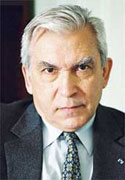 On February 24, Adam Daniel Rotfeld, former Foreign Minister of Poland, talked with Walter Kemp, IPI’s Director for Eastern Europe and Central Asia. Rotfeld is a Commissioner of the Euro-Atlantic Security Initiative (EASI), which has recently issued a report, Towards a European-Atlantic Security Community.
On February 24, Adam Daniel Rotfeld, former Foreign Minister of Poland, talked with Walter Kemp, IPI’s Director for Eastern Europe and Central Asia. Rotfeld is a Commissioner of the Euro-Atlantic Security Initiative (EASI), which has recently issued a report, Towards a European-Atlantic Security Community.
“What’s new about this security community, and how is it different from the Organization for Security and Co-operation in Europe (OSCE)?” asked Kemp. Rotfeld explained that EASI is trying to recapture a sense of cooperation within the Euro-Atlantic region, particularly between Russia, the United States and the European Union. “The problem is not the lack of political will, but the lack of common aims,” said Rotfeld. The point of the EASI report has been to try to define common aims and map out a way of achieving them together, inter alia, through the OSCE.
Rotfeld also suggested that in order to find common ground in the future, it is essential to overcome the divisions of the past. As co-chairman of the Polish-Russian Group on Difficult Matters, he has personally been involved in the rapprochement between Poland and Russia. He cited the Polish-Russian reconciliation process and the ongoing work between historians of the two countries, as well as between the Roman Catholic and Russian Orthodox churches. He suggested that such a process could act as an inspiration for reconciliation between other countries or groups.
He underlined the need for engaging civil society, and how this is enabled by modern technology. “We are living in the twenty-first century, in the period where in fact millions of people are participating in the political process,” he said. “The nature of politics–domestic and international–is changing. Recent events, like the uprisings in North Africa, demonstrate what happens when millions of people would like to have an influence on the politics.”
Reconciliation is also badly needed in relation to arms control. Rotfeld, who is an expert on arms control, noted the lack of progress on reducing conventional and nuclear arsenals. However, he observed that one reason may be the result of shifting expectations. “In the 1960s, we talked about reducing the number of weapons on both sides. Now, the aim is much more ambitious: how to eliminate the probability of war among states. This is much more difficult, but it is possible.”
Looking at countries such as Iran and North Korea that pose the gravest threat and could unsettle regional stability and unleash catastrophic counter-proliferation initiatives, Rotfeld explained that achieving a world free of nuclear weapons requires different and well-adapted strategies. “North Korea has nuclear weapons for domestic reasons, to keep the totalitarian regime in place. Iran has nuclear weapons for external use.”
At the end of their conversation, Rotfeld and Kemp considered the evolving normative framework of the multilateral system. Rotfeld suggested that the UN Charter could be considered “the Old Testament.” When asked if there is a New Testament, he said, “The New Testament was composed by the Evangelists. They were four different views, and, in that sense, if this analogy should be continued, one can say that we have some elements of the New Testament.”
“For example, the report prepared by the independent commission with Gareth Evans and Mahmud Sahnoun (on RtoP) was one of these pieces of the New Testament. But not the only one. Even more important was the Outcome Document of the summit of 2005. We have had a lot of other documents.”
“In other words, one should not be very ambitious to have one, unified, single act. The New Testament will be composed of these types of pieces, which will reflect in much more adequate way the new situation of our time than something what happened in 1945.”




